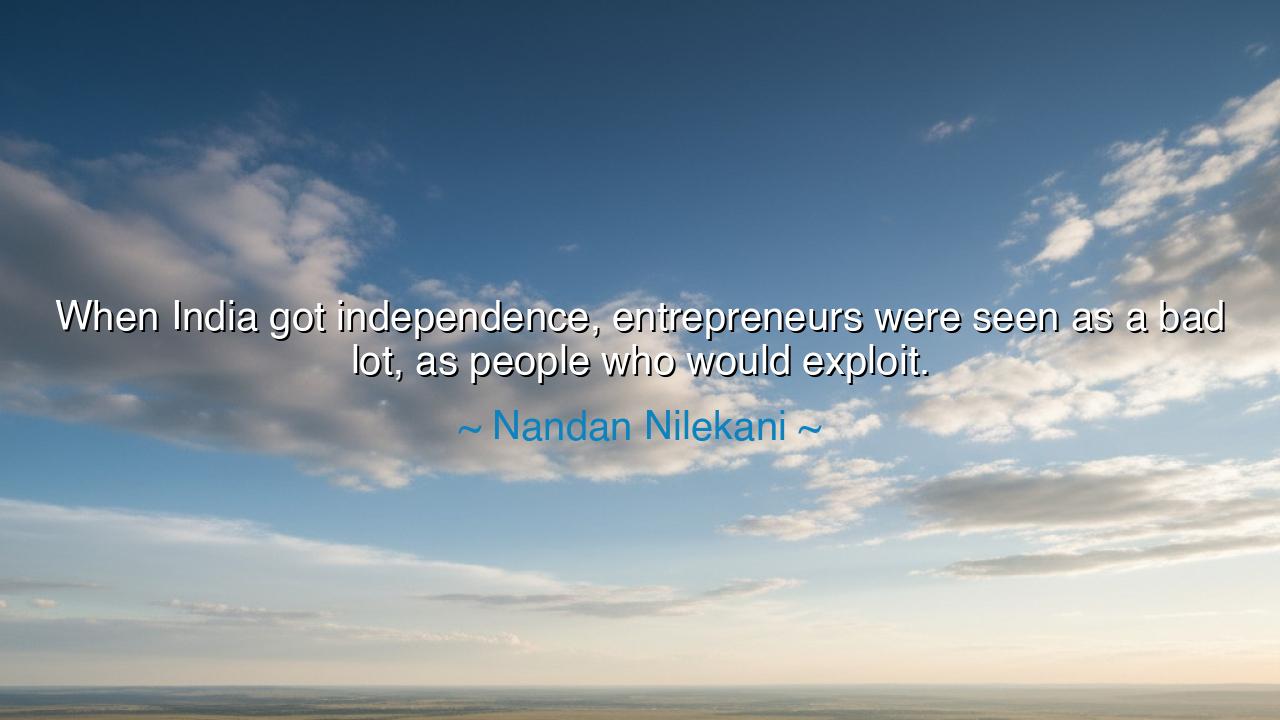
When India got independence, entrepreneurs were seen as a bad
When India got independence, entrepreneurs were seen as a bad lot, as people who would exploit.






Hear the thoughtful words of Nandan Nilekani, visionary and builder of modern India: “When India got independence, entrepreneurs were seen as a bad lot, as people who would exploit.” In this reflection lies not only a commentary on economics, but a meditation on history, culture, and the human spirit. Nilekani, himself a child of a free India and a pioneer of its technological rebirth, speaks of a time when independence had just been won, but the nation’s understanding of freedom — economic as well as political — was still unfolding. His words remind us that liberty without trust in creativity, and equality without belief in enterprise, cannot fulfill the promise of a new dawn.
The origin of this thought lies in the years immediately following India’s Independence in 1947. The nation had thrown off the chains of colonial rule after centuries of exploitation by imperial power. Poverty was vast, inequality deep, and suspicion toward wealth and commerce ran strong. To many, the figure of the entrepreneur resembled the colonial merchant — one who profits while others toil. The wounds of exploitation were fresh, and so the new India turned inward, embracing state control, central planning, and protectionism. Factories and fields were to be guided by government hands, for fear that private ambition would once again enslave the masses. Nilekani’s words recall this era of mistrust, when enterprise was not celebrated as a force of creation, but condemned as a shadow of greed.
Yet beneath his reflection lies not reproach, but understanding. For the newly independent nation had inherited a broken economy and a shattered faith. The British had left behind rails and ports, but also deep scars of economic subjugation. It was natural, then, for leaders like Jawaharlal Nehru to believe that only the state could protect the weak and rebuild the land. And so, for decades, India’s brightest minds were guided toward bureaucracy, law, or academia, while the spirit of entrepreneurship — the courage to create, to risk, to build — was looked upon with suspicion. Those who sought profit were seen as self-serving, not as servants of national progress.
But history is a river that does not stop flowing, and in time, a new generation began to see the truth that Nilekani himself embodies: that enterprise, when rooted in integrity, is not exploitation but empowerment. The same energy that once built empires could, when guided by purpose, build nations. When the gates of the Indian economy were opened in the early 1990s, after years of stagnation, the world witnessed the return of a long-dormant force — the innovative spirit of the Indian people. Nilekani, as co-founder of Infosys, stood among those who transformed the image of the entrepreneur from a symbol of greed to a beacon of opportunity. He and his peers proved that profit and progress need not be enemies; that in serving markets, one may also serve mankind.
Consider, for instance, the transformation of Dhirubhai Ambani, the son of a village schoolteacher who rose to become one of India’s greatest industrialists. In another age, he might have been dismissed as one who seeks personal gain. Yet through his daring, he built industries that employed thousands and lifted millions into the orbit of modernity. Such is the paradox Nilekani’s words evoke: that wealth, when hoarded, corrupts; but when circulated, it nourishes. Just as fire can destroy or warm, so can enterprise enslave or liberate — depending on the spirit of the one who wields it.
The ancients, too, spoke of this truth in their own way. In the Bhagavad Gita, Lord Krishna teaches that action, when done without selfish attachment, becomes karma yoga — the path of righteous work. To build, to create, to engage in commerce, if done in the spirit of service, becomes not exploitation but worship. Nilekani’s reflection reminds us that India, having first feared the power of enterprise, later rediscovered it as one of its greatest strengths. For a nation’s freedom is incomplete until its people are free to dream, to invent, and to prosper through their own labor.
So let this be the lesson: that independence is not a single moment in time, but a continuous act of awakening. Political freedom must give birth to economic and creative freedom, or it will wither into dependency once more. Do not despise the builder, the trader, or the innovator, for in their courage lies the pulse of progress. But let every entrepreneur remember also that true wealth is measured not by gold or power, but by the good it brings to others.
Thus, my children, remember Nilekani’s wisdom: after freedom from foreign rule, a nation must win another freedom — freedom of enterprise, guided by ethics, rooted in compassion. To fear ambition is to fear the sun; to misuse it is to scorch the earth. But to harness it wisely — to build, to share, to uplift — is to fulfill the promise of independence itself. And in that harmony of vision and virtue lies the true golden age of any land.






AAdministratorAdministrator
Welcome, honored guests. Please leave a comment, we will respond soon